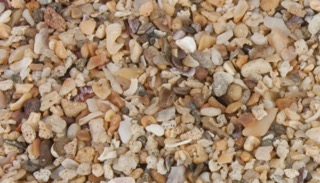Do Chickens Need Shell Grit?
Do My Chickens Need Shell Grit?
New chicken owners often ask, what is shell grit and why is it important?
With a wide range of chicken health products available,
What is shell grit?
Shell grit is a chicken dietary supplement, aiding in digestion and also benefiting their dietary health. Shell grit is made of ground up, gritty sea shells. It both looks and feels like a very coarse sand.
Shell grit and digestion
Chickens don't have teeth, yet they are able to eat a remarkable amount of food due to their incredible digestive system.
Chickens swallow their food whole. It can then be stored in the crop for several hours, allowing chickens to eat a lot all at once and digest it later. Beneficial microbes in the crop start the digestive process, beginning to break down the food.
From the crop, food passes to the gizzard. The gizzard is the reason why chickens don't need teeth. This muscular organ uses grit to grind up the food so that nutrients can be easily absorbed in the intestines. The gizzard can even break down tough seeds and grains! Even chickens that eat mostly pellets still need grit in their gizzard to grind up their food.
So what makes up the grit in the gizzard? Wild and free ranging chickens eat small stones and shells to help their digestion. And backyard chicken keepers provide shell grit so their chickens are able to break down foods in the gizzard.
But even if your laying hens free range and can find their own grit, you should still provide them with shell grit. Why? For the calcium.
Calcium in shell grit
Not only will shell grit assist in the breakdown of chicken feed
Making eggs, and shells, requires a lot of calcium. If this calcium is not readily available in the chicken's diet, calcium will be depleted from stores in the skeleton. This, in turn, results in poor, weak
Shell grit that sits in the gizzard provides a bank of calcium which is slowly digested as stomach acids, enzymes and the grinding action dissolve the shells. Even though most chicken feeds contain calcium, the large particle, slow-release calcium provided by shell grit is essential for egg shell quality. In fact, studies have shown that chickens need both small particle calcium, as in feed, and large particle calcium, from shell grit, for egg production and health!
How to feed shell grit to your chickens
You should always encourage easy access to shell grit. Serve the grit on a large, heavy-based dish so your hens can peck at it when they choose to.
Always ensure a fresh, clean supply of shell grit for hens that are 20 weeks and older. Replace grit if it becomes dirty.
Shell grit should always be provided "free choice" so that your hens can eat it whenever they want to. Your chickens will know when they need more calcium or grit, and providing the supplement "free choice" lessens any risk of overdose or deficiency. You will find that your chickens often consume grit before roosting for the night in order to help with egg shell development.
Mixing shell grit or other calcium sources with feed is dangerous and should never be done.
Note: Shell grit is not feed and is used in conjunction with a balanced diet.
Can roosters have shell grit?
Roosters and other chickens that are not laying, such as pullets or retired hens, still need grit to aid digestion. However, they shouldn't really be given shell grit because it can contain too much calcium for them. A stone-based grit is better.
That said, most chicken keepers keep all their birds in one flock and just provide shell grit. In most cases, this doesn't seem to be a problem for roosters or older hens. Pullets, young birds that may not have yet learned to regulate their own calcium intake, may be more at risk of a calcium overdose.
What about egg shells for chickens?
Some chicken keepers feed their chickens egg shells.
While you can give your chickens egg shells for extra calcium, they do not act as a supplement for shell grit. Your chickens always need shell grit, even if you give them egg shells as well. This is because the calcium in egg shells is largely small particle, meaning while they provide calcium they cannot be used as a replacement for large particle shell grit!
Happy chicken keeping!
Rachael at Dine a Chook






